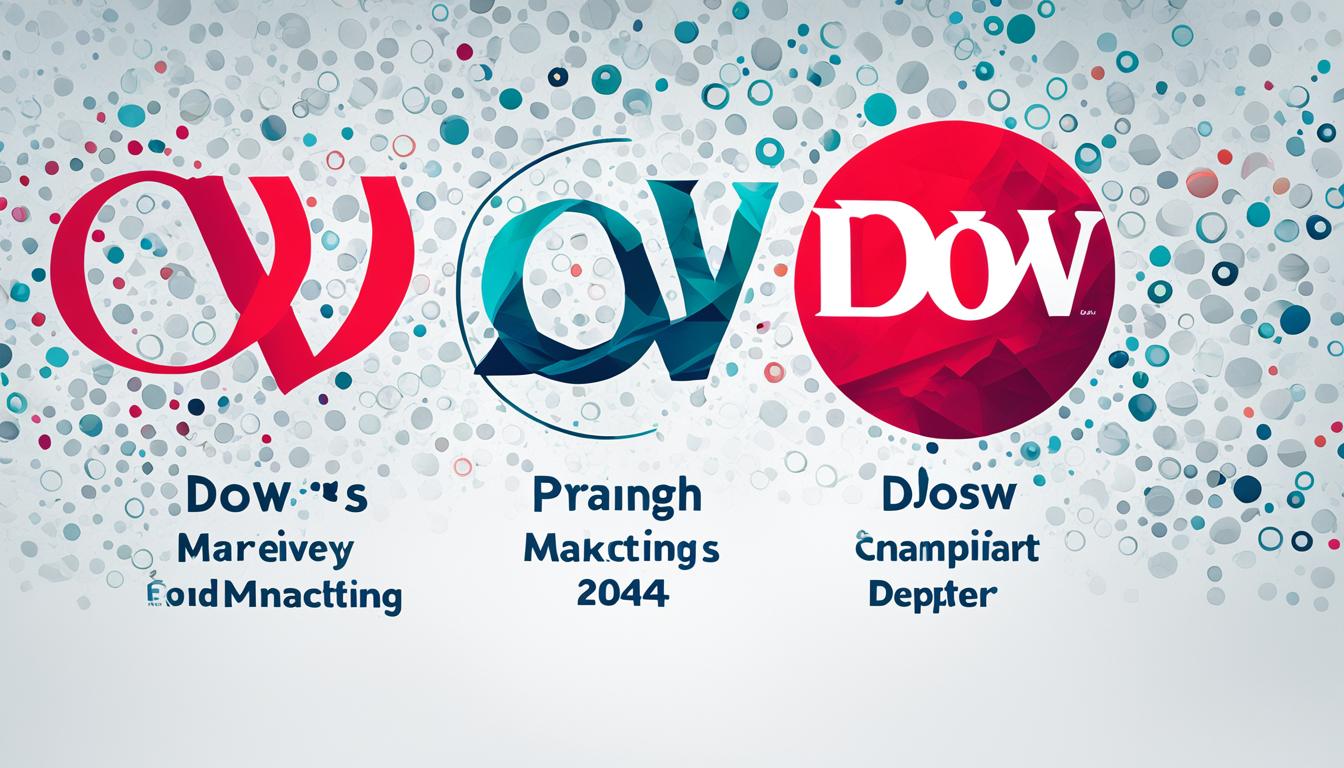Organic marketing is a powerful strategy that can drive sustainable traffic to your business over time. Unlike paid methods, organic marketing focuses on creating and promoting high-quality content to attract and engage your target audience naturally. By leveraging channels like SEO, social media, and email marketing, organic marketing helps increase brand awareness and foster a genuine connection with your customers.
To put it simply, organic marketing is all about using non-promotional tactics to build trust, credibility, and long-term relationships. Instead of relying on paid advertising, it emphasizes providing value to your audience through informative and engaging content. By consistently delivering valuable content, you can position your brand as an authority in your industry and attract organic traffic to your website.
Key Takeaways:
- Organic marketing is a strategy that generates traffic to your business naturally.
- It involves creating and promoting high-quality content through channels like SEO, social media, and email marketing.
- The main goal of organic marketing is to increase brand awareness and build a connection with your audience.
- Organic marketing is different from paid marketing as it focuses on using non-promotional tactics to attract and engage customers.
- By consistently providing value to your audience, you can establish trust, credibility, and long-lasting relationships.
Benefits of Organic Marketing
Organic marketing provides numerous benefits that can significantly impact a business’s growth and success. By utilizing organic marketing strategies, businesses can capitalize on the following advantages:
- Building brand awareness and recognition: Organic marketing allows businesses to establish their brand presence within their target market by consistently delivering valuable content that resonates with their audience.
- Improving brand reputation: Through organic marketing efforts, businesses can showcase their expertise, industry knowledge, and commitment to providing value, thereby enhancing their brand’s reputation and credibility.
- Driving website traffic: With organic marketing, businesses can attract relevant visitors to their website through search engine optimization (SEO), social media engagement, and content marketing initiatives.
- Targeting interested leads: Organic marketing enables businesses to reach potential customers who are actively searching for solutions or information related to their products or services, increasing the likelihood of converting them into paying customers.
- Reinforcing word-of-mouth promotion: When businesses consistently deliver value through organic marketing, satisfied customers are more likely to share their positive experiences with others, leading to increased word-of-mouth promotion and brand advocacy.
- Nurturing and qualifying leads: Organic marketing allows businesses to nurture leads through various touchpoints, providing relevant content and building trust over time. This helps qualify leads and identify those most likely to convert into customers.
- Creating opportunities for effective paid advertising campaigns: Building a solid organic marketing foundation establishes an engaged audience that can be retargeted through paid advertising campaigns, maximizing their effectiveness.
By leveraging organic marketing strategies, businesses can establish meaningful connections with their audience, cultivate long-lasting relationships, and ultimately drive sustainable growth.
How Does Organic Marketing Work?
Organic marketing is a powerful strategy that harnesses the potential of valuable content to attract and engage users naturally. By understanding how organic marketing works, businesses can leverage this approach to build brand awareness, drive website traffic, and establish long-term relationships with their audience.
Organic marketing revolves around creating exceptional content that resonates with users’ interests and needs. This content can take various forms, such as blog posts that provide in-depth insights, videos that entertain and educate, social media posts that spark conversations, and email newsletters that deliver valuable information directly to the inbox.
In order to maximize the reach and impact of this content, it’s crucial to optimize it for search engines. By conducting thorough keyword research and incorporating relevant keywords naturally into the content, businesses can increase their visibility in search engine results and drive organic traffic to their website.
One way to incorporate organic marketing into your content strategy is by utilizing search engine optimization (SEO) techniques. This involves optimizing your content to improve its ranking on search engine result pages. By strategically placing keywords, creating high-quality backlinks, and ensuring mobile-friendly website design, you can enhance the discoverability and visibility of your content.
Additionally, organic marketing thrives on social media platforms. By sharing your valuable content on social media channels, you can increase its reach and engagement. Encourage your followers to share, like, and comment on your posts to foster a sense of community and create brand advocates.
Ultimately, the goal of organic marketing is to provide value to users and build trust and credibility over time. By consistently delivering valuable and relevant content to your audience, you can establish yourself as an industry authority and develop a loyal following.
Benefits of Organic Marketing:
- Increased brand awareness
- Enhanced website traffic
- Established trust and credibility
- Long-lasting customer relationships
- Improved search engine visibility
In the next section, we will explore the differences between organic marketing and paid marketing, highlighting the unique advantages of each approach.
Organic Marketing vs Paid Marketing
When it comes to marketing strategies, organic marketing and paid marketing take different approaches to achieve their goals. Organic marketing focuses on attracting and engaging users naturally through non-paid tactics, such as content creation and search engine optimization (SEO). On the other hand, paid marketing relies on paid methods, like advertising and sponsored content, to quickly reach and convert audiences.
Organic marketing aims to build brand awareness and relationships over a longer period of time. By creating valuable and relevant content, businesses can establish themselves as industry authorities, gaining the trust and loyalty of their audience. This approach fosters long-term customer relationships and helps businesses stay top-of-mind when customers are ready to make a purchase.
Paid marketing, on the other hand, is focused on immediate results and sales. By investing in targeted advertising campaigns, businesses can reach a wider audience and quickly generate leads and conversions. Paid marketing is especially effective for time-sensitive promotions, product launches, or when businesses need to quickly boost their visibility in a competitive market.
While organic marketing and paid marketing have different objectives, they can both play an important role in a comprehensive marketing strategy. By harnessing the power of organic marketing to build brand awareness and relationships, businesses can lay a solid foundation for their overall marketing efforts. Paid marketing can then be used strategically to drive immediate results, complementing the long-term benefits of organic marketing.
Ultimately, the choice between organic marketing and paid marketing depends on the specific goals and resources of each business. Some businesses may prioritize building organic visibility and trust, while others may focus on immediate sales and conversions. By understanding the strengths of each approach and tailoring strategies accordingly, businesses can create a robust marketing plan that drives sustainable growth and achieves their desired outcomes.
Organic Marketing Examples
Organic marketing offers businesses a range of methods to create and promote valuable content, attracting and engaging their target audience. Let’s explore some examples of organic marketing initiatives:
- Unpaid Social Media Posts: Regularly posting relevant and engaging content on social media platforms, such as Facebook, Instagram, and Twitter, can help businesses build a loyal following and increase brand visibility.
- Blog Posts: Creating informative and well-optimized blog posts allows businesses to showcase their expertise, attract organic search traffic, and establish thought leadership within their industry.
- Guest Posts: Publishing guest posts on industry-leading blogs and websites enables businesses to reach new audiences, build credibility, and drive traffic back to their own website.
- User-Generated Content: Encouraging customers to share their experiences and opinions about products or services through reviews, testimonials, or user-generated content is an effective way to increase brand authenticity and engage with potential customers.
- Email Newsletters: Regularly sending informative and relevant newsletters to subscribers can help businesses nurture relationships, share valuable content, and drive traffic to their website.
- SEO Optimization: Optimizing website content, including meta tags, headings, and keyword-rich copy, helps businesses improve their organic search rankings and attract targeted traffic from search engines.
- Online PR and Link Generation: By strategically partnering with influencers, industry experts, or news outlets, businesses can generate valuable backlinks, increase brand exposure, and enhance their online reputation.
- YouTube Videos: Creating engaging and informative videos on YouTube can help businesses reach a large audience, demonstrate product or service value, and build a loyal subscriber base.
These examples illustrate the diverse range of tactics businesses can employ in their organic marketing efforts. By carefully selecting and implementing these strategies, businesses can attract and engage their target audience, ultimately driving brand awareness, website traffic, and customer loyalty.
Importance of Organic Marketing
Organic marketing plays a crucial role in the success of businesses by enabling them to build trust, establish credibility, and foster long-term relationships with their target audience. Unlike paid marketing methods, organic marketing focuses on creating authentic connections with customers through natural means, driving sustainable growth and fostering customer loyalty.
One of the key benefits of organic marketing is its ability to create brand awareness and improve brand reputation. By delivering valuable content and engaging with their audience through channels like SEO, social media, and email marketing, businesses can establish a strong presence, contribute to industry conversations, and position themselves as trusted authorities within their niche.
Furthermore, organic marketing is essential for generating organic traffic to a website. When businesses invest time and effort in creating high-quality, informative content that resonates with their target audience, they attract users who are genuinely interested in their products or services. This targeted approach increases the likelihood of converting website visitors into loyal customers.
A notable advantage of organic marketing is its ability to complement paid marketing efforts. By retargeting users who have interacted with the brand organically, businesses can reinforce their messaging and enhance the effectiveness of their paid campaigns. This cross-channel approach maximizes the reach and impact of marketing efforts, ultimately driving more leads and conversions.
Moreover, organic marketing offers a cost-effective way for businesses to achieve their marketing goals. By focusing on building relationships and delivering value to their audience, businesses can reduce their reliance on costly paid advertising. Organic marketing strategies also provide long-term benefits, as the efforts put into building trust and credibility gradually compound over time, resulting in consistent growth and success.
In summary, the importance of organic marketing cannot be overstated. It enables businesses to establish their brand, attract targeted traffic, enhance their reputation, and maximize the effectiveness of their overall marketing strategy. By prioritizing organic marketing, businesses can lay a solid foundation for long-term success and sustainable growth.
Getting Started with Organic Marketing
To embark on your organic marketing journey, it’s important to lay the foundation for success. Here’s a step-by-step guide to help you get started:
Analyze Your Current Traffic Patterns
The first step is to analyze your website’s current traffic patterns. This will provide insights into your audience demographics, behavior, and preferences. Use tools like Google Analytics to gather data on your website visitors, including traffic sources, user engagement, and popular content.
Identify Your Target Audience
Once you understand your current traffic patterns, it’s crucial to identify your target audience. Consider their demographics, interests, and pain points. This will help you create content that resonates with them and meets their needs. Conduct market research, analyze customer feedback, and leverage social listening tools to gain a deeper understanding of your audience.
Create Valuable Content
With your target audience in mind, create high-quality, valuable content that aligns with their interests and needs. This can include blog posts, articles, videos, infographics, and more. Ensure that your content provides useful information, solves problems, and engages your audience. Additionally, optimize your content with relevant keywords to increase its visibility on search engines.
Optimize for Search Engines
To maximize organic traffic to your website, it’s essential to optimize your content for search engines. Conduct keyword research to identify relevant keywords and incorporate them naturally throughout your website, including in your headlines, meta tags, URLs, and within the content itself. This will help search engines understand the relevance of your content and improve your website’s visibility in search results.
Share on Relevant Platforms
Once you have valuable and optimized content, it’s time to share it on relevant platforms. Leverage social media channels, email marketing campaigns, industry forums, and content distribution platforms to reach your target audience. Engage with your audience by responding to comments, answering questions, and participating in discussions. This will help you build a loyal community around your brand.
Evaluate and Improve
Regularly evaluate the performance of your organic marketing efforts. Monitor key metrics such as website traffic, engagement rates, conversion rates, and social media interactions. Identify areas for improvement and make necessary adjustments to your content and distribution strategies. Stay updated with industry trends and adapt your organic marketing approach accordingly to ensure continued success.
By following these steps and consistently refining your strategy, you can lay a strong foundation for organic marketing success. Remember, organic marketing is a long-term investment that requires patience and dedication, but the results can be highly rewarding.
Organic Marketing Strategies
Implementing effective organic marketing strategies is crucial for businesses looking to attract and engage their target audience, build brand recognition, and establish long-lasting customer relationships. Here are some proven organic marketing strategies:
1. Search Engine Optimization (SEO)
Optimizing your website for high rankings in search engine results is a fundamental organic marketing strategy. By conducting keyword research, creating quality content, and optimizing on-page elements, you can increase your website’s visibility and organic traffic.
2. Diverse Content Creation
Create various types of content to cater to different audience preferences. Produce engaging blog posts, informative videos, and shareable social media posts that provide value to your target audience. This diverse content approach helps attract and retain users.
3. Affiliate Marketing
Implementing an affiliate program can expand your reach and attract new customers. By collaborating with affiliates who promote your products or services, you can leverage their audiences and benefit from increased exposure and referral traffic.
4. Targeted Email Campaigns
Email marketing remains a powerful tool for organic marketing. Segment your audience based on their interests and behaviors, and deliver personalized and targeted email campaigns that provide value and nurture leads over time.
5. Social Media Engagement
Establish a strong presence on social media platforms that align with your target audience. Engage with your followers by sharing valuable content, addressing their concerns, and fostering meaningful conversations. This helps build brand awareness and loyalty.
By implementing these organic marketing strategies, you can position your business for long-term success and organic growth. It’s essential to regularly evaluate and adjust your strategies based on analytics and consumer insights to maximize results.
Building Trust and Credibility
Building trust and credibility is an essential aspect of organic marketing. When businesses prioritize these factors, they can establish a strong reputation, gain the loyalty of their audience, and foster long-term relationships. Here are some key strategies to build trust and credibility:
- Create valuable content: Generating high-quality content that addresses your audience’s needs and provides relevant information is crucial. By offering valuable insights and solutions, you position yourself as a trusted authority in your industry.
- Transparency and authenticity: Being open and honest with your audience helps build trust. Maintain transparency in your communications, disclose any potential conflicts of interest, and share behind-the-scenes glimpses of your business.
- Exceptional customer service: Providing exceptional customer service goes a long way in building trust. Respond promptly to inquiries, address customer concerns empathetically, and strive to exceed expectations.
- Consistent delivery: Consistently delivering on your promises helps establish credibility. Stay true to your brand values, meet deadlines, and ensure that your products or services consistently meet or exceed customer expectations.
By incorporating these strategies into your organic marketing efforts, you can cultivate a reputation for trustworthiness and credibility. When customers believe in your brand and feel confident in their interactions with you, they are more likely to become loyal advocates and recommend your business to others.
| Benefits of Building Trust and Credibility | Examples |
|---|---|
|
|
Measuring Organic Marketing Success
When it comes to organic marketing, measuring success is crucial for determining the effectiveness of your efforts and making data-driven decisions. By analyzing various metrics, businesses can gain valuable insights to optimize their strategies and achieve continuous improvement.
Metrics to Analyze
To measure the success of your organic marketing efforts, it’s important to focus on key metrics that reflect your goals and objectives. Here are some metrics worth analyzing:
- Website Traffic: Monitor the number of visitors to your website, as well as the sources of traffic, such as organic search, social media, or referrals.
- Leads Generated: Track the number of leads that are generated through organic efforts, whether it’s through forms, email sign-ups, or other conversion actions.
- Conversion Rates: Calculate the percentage of website visitors who take a desired action, such as making a purchase or filling out a form.
- Channel Effectiveness: Assess the performance of different organic marketing channels, such as social media platforms, email newsletters, or blog posts.
Tools for Analysis
To effectively measure organic marketing success, businesses can leverage various tools that provide valuable data and insights. Two popular tools include:
- Google Analytics: This free tool allows you to track website performance, user behavior, and traffic sources. It provides detailed reports and visualizations to help you understand the impact of your organic marketing efforts.
- Ahrefs: A comprehensive SEO tool that offers insights into keyword rankings, backlinks, and competitor analysis. It helps you identify opportunities for improvement and measure the impact of your organic marketing strategies.
By regularly monitoring and analyzing these metrics, businesses can gain a deeper understanding of their organic marketing performance and make data-driven decisions to optimize their strategies.
Continuous Improvement
Measuring organic marketing success is not a one-time task but an ongoing process. By regularly monitoring and adjusting your strategies based on the insights gathered, you can continuously improve your campaign’s performance.
Here’s a table summarizing the key steps for measuring and improving organic marketing success:
| Step | Description |
|---|---|
| Set Clear Goals | Define specific and measurable goals that align with your business objectives. |
| Choose Relevant Metrics | Select metrics that directly reflect the success of your organic marketing efforts. |
| Implement Tracking Tools | Utilize tools like Google Analytics and Ahrefs to collect and analyze data. |
| Analyze and Interpret Data | Regularly review metrics, identify trends and patterns, and draw insights. |
| Make Data-Driven Decisions | Based on insights gained, adjust your organic marketing strategies accordingly. |
| Monitor and Optimize | Continuously monitor metrics, track progress, and optimize your campaigns over time. |
By following these steps and leveraging the right tools, businesses can effectively measure and enhance the success of their organic marketing efforts, leading to improved brand visibility, increased website traffic, and higher conversions.
Organic Marketing for Different Platforms
Organic marketing is a versatile strategy that can be implemented across various platforms to effectively reach and engage the target audience. Each platform requires a different approach and content strategy to maximize organic marketing success. By understanding the nuances of each platform and optimizing the content accordingly, businesses can effectively leverage organic marketing for different platforms.
Social Media
Social media platforms like Facebook, Instagram, Twitter, and LinkedIn provide a valuable opportunity to connect with the target audience organically. Businesses can create compelling and shareable content, interact with followers, and build a community around their brand. It’s important to tailor the content to each platform’s unique features and user expectations. For example, using visually appealing images on Instagram and utilizing hashtags to increase discoverability.
Blogs
Blogging is a powerful platform for organic marketing as it allows businesses to showcase their expertise and provide valuable insights to the target audience. By consistently creating high-quality blog posts that address the audience’s pain points and interests, businesses can attract organic traffic and establish themselves as thought leaders in their industry. Optimizing blog posts for search engines with relevant keywords and internal linking also enhances organic visibility.
YouTube
YouTube is the world’s second-largest search engine and offers immense potential for organic marketing. By creating compelling video content, businesses can engage their audience and tap into the platform’s vast user base. YouTube videos should be optimized with targeted keywords, attention-grabbing titles, and visually appealing thumbnails. Building a loyal subscriber base and encouraging viewers to like, share, and comment on videos can also boost organic reach.
Email Marketing
Email marketing is a highly effective platform for nurturing and engaging leads, as well as driving conversions. By creating valuable and personalized email campaigns, businesses can build trust and establish strong relationships with their audience. Implementing opt-in strategies and segmentation ensures that the content is relevant and resonates with subscribers. Tracking metrics like open rates, click-through rates, and conversions allows businesses to measure the effectiveness of their organic email marketing efforts.
| Platform | Key Benefits |
|---|---|
| Social Media | – Wide reach and engagement – Building brand community – Sharing compelling content |
| Blogs | – Establishing thought leadership – Driving organic traffic – Providing valuable insights |
| YouTube | – Access to a large user base – Engaging video content – Boosting organic reach |
| Email Marketing | – Nurturing and engaging leads – Building trust and relationships – Driving conversions |
Implementing organic marketing strategies on different platforms allows businesses to diversify their reach and engage their target audience on multiple fronts. By understanding the unique dynamics and optimization techniques for each platform, businesses can unlock the full potential of organic marketing and achieve their marketing goals.
Conclusion
In conclusion, organic marketing is an invaluable strategy for businesses looking to establish a strong online presence and connect with their target audience. By creating and promoting high-quality content, brands can build brand awareness, trust, and credibility over time. Although organic marketing requires time and effort to yield visible results, the long-term benefits make it a worthwhile investment.
Through organic marketing, businesses can attract and engage their audience naturally, without relying solely on paid advertising. By providing valuable content that addresses their audience’s interests and needs, brands can foster meaningful connections and establish long-term customer relationships. This organic approach sets businesses apart by focusing on building trust and delivering value.
While incorporating organic marketing into your overall marketing strategy may require a shift in mindset and resources, the rewards are well worth it. The sustainable nature of organic marketing allows businesses to generate consistent traffic and conversions, even when compared to the immediate results of paid advertising campaigns. By embracing organic marketing tactics and consistently delivering valuable content, businesses can rise above the noise and create a lasting impact in their respective industries.





